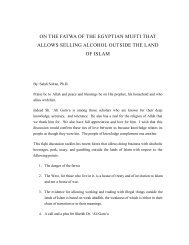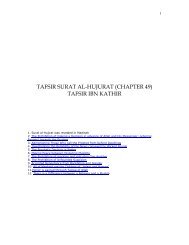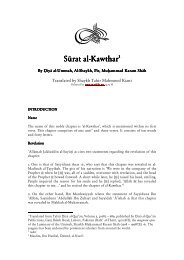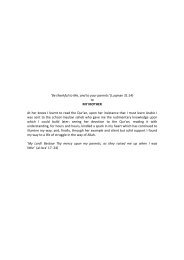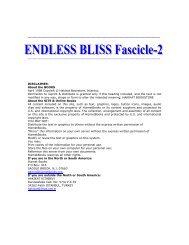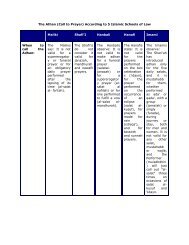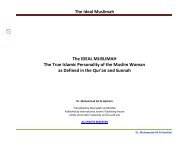Rebellion and Civil Disobedience in Islam The Need for a Paradigm ...
Rebellion and Civil Disobedience in Islam The Need for a Paradigm ...
Rebellion and Civil Disobedience in Islam The Need for a Paradigm ...
Create successful ePaper yourself
Turn your PDF publications into a flip-book with our unique Google optimized e-Paper software.
5) <strong>The</strong>re are some scholars among various schools who deemed rebellion lawful <strong>and</strong>even obligatory to remove <strong>in</strong>justice, <strong>and</strong> not just kufr (<strong>in</strong>fidelity) 28 . Ibn Hazm went as faras declar<strong>in</strong>g the ruler who ordered his soldiers to cause corruption on earth, as a muharib(b<strong>and</strong>it). To him, the baghi is not the one ris<strong>in</strong>g aga<strong>in</strong>st the ruler; he is rather the one whotransgresses. <strong>The</strong> ruler himself can be a baghi or even a b<strong>and</strong>it under certa<strong>in</strong>circumstances 29 . <strong>The</strong> Hanafi scholar al-Simnani argued that if the ruler becomes unjust, itbecomes <strong>in</strong>cumbent upon the jurists <strong>and</strong> Muslims to overthrow him 30 . Ibn Muflih 31(Hanbali) noted that the two Hanbali jurists, Ibn al-Jawzi <strong>and</strong> Ibn ‘Aqil, permittedrebellion aga<strong>in</strong>st an unjust ruler. <strong>The</strong> Shafi‘i scholar Al-Juwayni argued that if a manpossesses enough power, it is legal <strong>for</strong> him to rebel <strong>for</strong> the sake of realiz<strong>in</strong>g justice <strong>and</strong>“may Allah aid him to victory.” 32 In another book 33 , he argued that if a ruler becomesoppressive, the possessors of power 34 <strong>in</strong> society may cooperate <strong>in</strong> resist<strong>in</strong>g <strong>and</strong> correct<strong>in</strong>ghim, even if it means that they would have to resort to the use of <strong>for</strong>ce <strong>and</strong> the wag<strong>in</strong>g ofwar aga<strong>in</strong>st the ruler. Many Zaydi, Ibadi, <strong>and</strong> Mu`tazili scholars encouraged armed<strong>in</strong>surrections to overthrow the unjust rulers. Some among them added the condition that ifsomeone wants to establish justice, enjo<strong>in</strong> the good, <strong>and</strong> <strong>for</strong>bid the evil, it is obligatory onhim to rebel if he believes he has the qualifications, material power <strong>and</strong> human supportthat guarantee him a reasonable chance of success. This condition is imposed to makesure that s<strong>in</strong>cere men would not be quickly defeated <strong>and</strong> crushed <strong>and</strong> thus people wouldsuffer perpetual <strong>in</strong>justice <strong>and</strong> oppression. I personally espouse this position, that rebellionis lawful <strong>and</strong> even obligatory to elim<strong>in</strong>ate tyranny, because I believe that the moralimperative should be given preference over the legal imperative <strong>for</strong> susta<strong>in</strong><strong>in</strong>g order <strong>and</strong>stability. Put differently: if we leave ourselves to be propelled by the legal imperative ofma<strong>in</strong>ta<strong>in</strong><strong>in</strong>g order, the moral imperative which is based on absolute values will berelegated to a secondary role. Ma<strong>in</strong>ta<strong>in</strong><strong>in</strong>g stability is good <strong>and</strong> required but not on theexpense of Jihad, establish<strong>in</strong>g justice, <strong>and</strong> discharg<strong>in</strong>g the obligation of enjo<strong>in</strong><strong>in</strong>g thegood <strong>and</strong> <strong>for</strong>bidd<strong>in</strong>g the evil.Back to the Juristic Culture:Now, I will shift emphasis to contemporary scholars. My po<strong>in</strong>t <strong>in</strong> this section is toshow how the juristic culture heavily depends on prior authority <strong>and</strong> how its <strong>in</strong>ertia(discussed above) is affect<strong>in</strong>g its views regard<strong>in</strong>g rebellions. I must emphasize that many28 For a comprehensive account of the positions of the various jurisprudential <strong>and</strong> theological schools onrebellion, refer to Abou El Fadl’s book, ‘<strong>Rebellion</strong> <strong>and</strong> Violence <strong>in</strong> <strong>Islam</strong>ic Law.’ I vehemently disagreewith his analysis which, <strong>in</strong> many cases, casts doubt on the Sunnah. And with his <strong>in</strong>sistence on describ<strong>in</strong>gthe juristic culture as both creative <strong>and</strong> selective, an assertion that doubts the s<strong>in</strong>cerity <strong>and</strong> correct belief ofthe jurists.29 Ibn Hazm, ‘al-Muhalla.’30 Al-Simnani, ‘Rawdat al-Qudah wa Tariq al-Najah.’31 In his book, ‘Kitab al-Furu`.’ He, however, argued that rebellion is never permitted, <strong>and</strong> that impatience<strong>and</strong> ignorance are the causes of all rebellions.32 See al-Juwayni, ‘Ghiyath al-Umam fi Iltiyath al-Qulam.’33 Al-Juwayni’s ‘Kitab al-Irshad ila Qawati` al-Adilla fi Usul al-I`tiqad.’34 Ahl al-hall wa al-‘aqd, literally, the people who loosen <strong>and</strong> b<strong>in</strong>d.15



